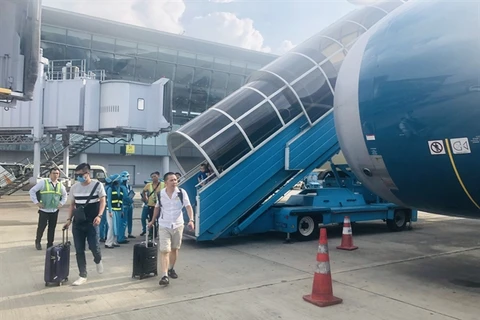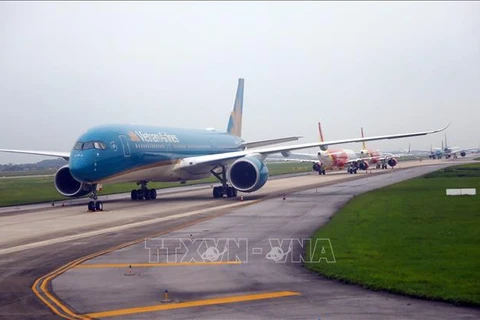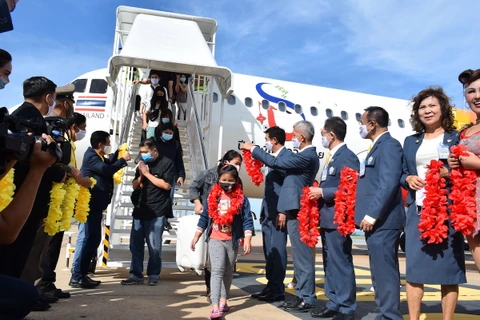Hanoi (VNA) - Vietjet Aviation Joint Stock Company has reported a loss of over 2.11 trillion VND (approx. 90.5 million USD) in air transportation business in the first half of this year.
The company on August 2 released its business result of 2020’s second quarter, the period that saw the most impact by the COVID-19 pandemic.
By the end of Q2, amid the COVID -19 pandemic, Vietjet records air transport revenue at 1.97 trillion VND (approx. 84.5 million USD), a decrease of 54 percent year-on-year, and a loss of over 1.12 billion VND (approx. 48 million USD).
To support its cash flow, Vietjet has proactively sought partners and implemented many financial solutions such as asset transfer and financial investment, which resulted in a financial revenue of 1.174 trillion VND (approx. 50.4 million USD) with a post-tax consolidated profit of 1.063 trillion VND (approx. 45.6 million USD) in Q2, and consolidated profit of 73 billion VND (approx. 3.2 million USD) in the first half, increasing financial resource for the airline’s air transport business. These results were achieved thanks to the solid financial base, which the company has accumulated for the past years.
As Vietnam opened its sky for domestic operation in June, Vietjet resumed all of its domestic flight network with 300 daily flights, a triple to five times growth compared to the figures at the country’s COVID-19 pandemic peak. The airline also launched eight new routes to meet rising domestic travel demand, increasing its total domestic flight network to 52 routes with overall flight operated reached 14,000 flights. Its total passenger carriage reached 1.2 million passengers, marking a positive recovery for the domestic market in June.
With the cost optimisation advantages following the models of LCCs worldwide, Vietjet has been proactively implementing cost-saving measures with an average cost drop of 55 percent due to operation capacity reduction of 30 – 35 percent and service cost decrease around 20 – 25 percent. Especially in May, Vietjet successfully stocked up on fuel when the fuel price was low, leading to a cost reduction of 25 percent compared to the market price. In addition, the carrier was also in talk with suppliers for a reduction of 20 percent up to 45 percent of charge for airport handling, technical activities and other services.
Aiming to become a new-age carrier, Vietjet has been stepping up commercial solutions based on 4.0 technology platform and mobile application development. Thanks to its tech-based cost optimisation capacity, the airline has seen an effectiveness when following LCC model, which has been proven to be the right choice for the past economic crises.
The airline’s total asset is 48.39 trillion VND (approx. 2.075 billion USD) with the owner’s equity being at 17.339 trillion VND (approx. 745 million USD) including treasury shares. Its current liquidity is kept at a good rate at 1.4 while debt to equity ratio is 0.57, which are among the lowest rates in the global aviation industry. It allows Vietjet to proceed with its long-term financing plan in order to enhance its internal resources for fighting the current pandemic.
Being active on measures to weather COVID-19 pandemic, Vietjet has implemented many solutions since early 2020, including expanding the cargo transportation business, developing SkyBoss product and ancillary services, and offering “Power Pass” and the unlimited flight pass. In addition, the carrier also started self-service ground operation at Noi Bai International Airport in Hanoi to be more active in operation, reduce costs, increase ancillary revenue, and especially improve passenger quality services. In particular, Vietjet has also worked on many solutions to increase revenue and optimise operations. It has boosted cargo transport service since April, being the first airline in Vietnam to gain the government’s approval to deploy cargo operations in the passenger cabin (CIPC).
Apart from the effort of the airline itself, the support of the government has also helped reduce the pressure and boost the aviation sector’s recovery. Following airlines’ proposal, the Government and industry authorities has considered support packages, including exemption of taxes, fees, aviation services, environmental tax exemptions for flight fuels, financial support, and extension of payment term./.
























